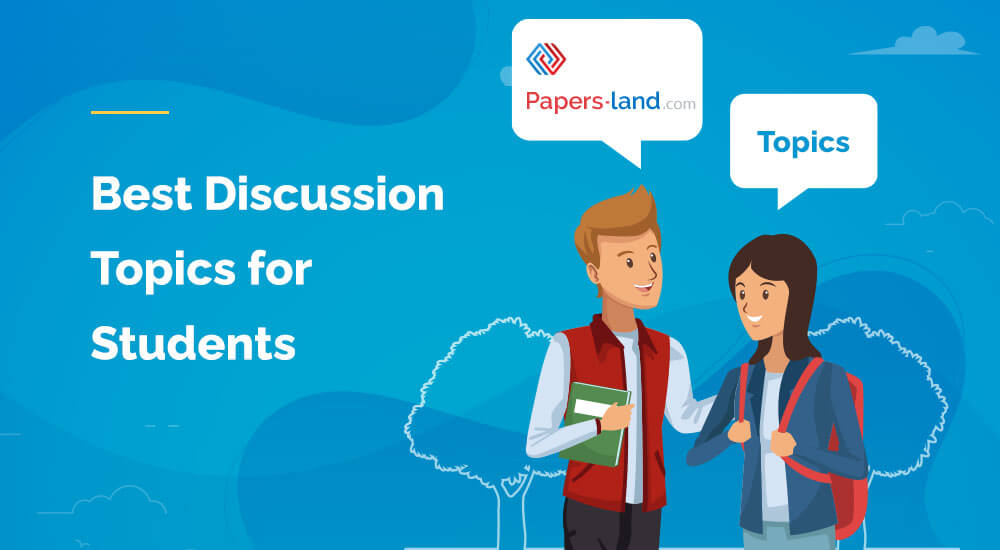Engaging in discussion and discussion board posts is important for academic learning. Discussion board posts offer a platform to share ideas, perspectives, and insights, which leads to a deeper understanding of various topics. Active participation in discussions can help enhance critical thinking skills, improve communication abilities, and build meaningful relationships with peers. In this article, we will explore some engaging discussion topics to help students make the most of their academic experience. So let’s get started!
Topics for Academic Discussion Board Posts
Here are 10 topics that are perfect for academic discussion board posts:
- The impact of social inequality on access to education and healthcare.
- The ethics of gene editing.
- The future of work in a post-pandemic world.
- The effectiveness of online learning.
- The role of government in regulating technology.
- The benefits and drawbacks of renewable energy sources.
- The impact of climate change on global health.
- The impact of automation on the job market.
- The role of media in shaping public opinion.
- The impact of globalization on cultural diversity.
Topics for Work-Related Discussion Board Posts
Here are 10 topics for work-related discussion board posts:
- Strategies for achieving work-life balance.
- Best practices for remote team collaboration.
- Tips for effective project management.
- Discuss ethical dilemmas in the workplace.
- Managing conflict in a professional setting.
- Innovation in the workplace – sharing ideas and success stories.
- Sharing knowledge and skills for career development.
- The impact of diversity and inclusion in the workplace.
- The future of work – exploring emerging trends and technologies.
- Health and safety in the workplace – best practices and tips.
Ten Engaging College Classroom Discussion Topics
- Is free speech a right or a privilege? Where do you draw the line?
- Is technology making us smarter or dumber?
- What is the role of social media in politics and society?
- Should college be free for everyone? Who should pay for it?
- Is climate change a real threat, and if so, what can we do to address it?
- How can we better support mental health on college campuses?
- Should there be limits on the power of corporations and the wealthy?
- What is the impact of globalization on local cultures and economies?
- Should voting be mandatory? Why or why not?
- Should athletes be allowed to kneel during the national anthem to protest racial injustice?
10 Unique Debate Topics
Here are ten unique debate topics for students that will ignite lively and thought-provoking discussions:
- Should social media be blamed for fake news on their site?
- Is animal testing necessary for medical research and development?
- Should prisoners be allowed to vote in elections?
- Is the use of nuclear energy a viable solution to combat climate change?
- Should schools eliminate homework? Why or why not?
- Is cultural appropriation ever acceptable?
- Is censorship necessary to protect children from harmful content?
- Should high schools allow student-led prayer groups on campus?
- Is it ethical for companies to use targeted advertising based on personal data?
- Should the drinking age be lowered or raised? Why?
10 Unique Current Events Discussion Topics
Here are ten current events discussion topics for students to stay informed and engaged:
- Should there be more regulation of social media companies following the Capitol Hill riot?
- How does COVID-19 affect the global economy and international relations?
- Should the U.S. government provide more aid to small businesses affected by the pandemic?
- How has the Black Lives Matter movement impacted society and the fight against systemic racism?
- Should the government provide free healthcare to all citizens?
- What is the impact of climate change on natural disasters such as wildfires and hurricanes?
- Should college athletes be paid for their contributions to their universities and the NCAA?
- What is the role of technology in modern education, and how has it been impacted by the pandemic?
- Should the U.S. continue to maintain a strong military presence in the Middle East?
- What are the potential implications of the rise of China as a global superpower?
10 Unique Critical Thinking Topics
Here are ten unique critical thinking topics for students to enhance their analytical skills:
- Is it ethical to use genetically modified organisms (GMOs) in agriculture?
- Should companies be held responsible for their environmental impact?
- Is the death penalty an effective form of punishment for heinous crimes?
- Should standardized testing be the primary method of evaluating student performance?
- Is a college education worth the cost?
- Should governments have the right to monitor citizens’ online activities to ensure national security?
- Should affirmative action be used to promote diversity in universities and workplaces?
- Is censorship ever justifiable in a democratic society?
- Should the government provide a universal basic income to all citizens?
- Is it ethical to use animals for scientific research?
10 Unique Social Issues Discussion Topics
Here are ten unique social issues discussion topics for students to foster empathy and awareness:
- How can we address the issue of income inequality and the wealth gap in society?
- Should the government provide affordable housing for low-income families?
- What are the long-term impacts of police brutality on communities of color?
- How can we combat discrimination and hate crimes against marginalized groups?
- Should the government provide free healthcare to all citizens?
- What are the effects of social media on mental health and well-being?
- How can we address the issue of human trafficking and modern-day slavery?
- Should prisoners have access to education and rehabilitation programs?
- How can we promote diversity and inclusivity in the workplace and educational institutions?
- What are the effects of climate change on vulnerable communities, and how can we mitigate them?
10 Group Discussion Topics
Here are ten unique group discussion topics for students to enhance collaboration and communication skills:
- Should schools teach financial literacy and money management skills to students?
- What are the ethical implications of gene editing and genetically modified organisms (GMOs)?
- How can we balance the need for privacy and security in the age of surveillance technology?
- Should college athletes be paid for their participation in sports?
- What are the effects of social media on interpersonal relationships and communication skills?
- How can we address the issue of food waste and promote sustainable agriculture?
- Should companies be held accountable for their impact on the environment and natural resources?
- What are the ethical implications of artificial intelligence and automation in the workforce?
- How can we promote mental health and well-being in the workplace and educational institutions?
- Should the government provide a universal basic income to all citizens?
10 Discussion Topics for College Students
- Mental health in college: how to cope with stress and anxiety.
- The future of technology: is it a blessing or a curse?
- Diversity in the classroom: why it matters and how to promote it.
- The impact of social media on society: pros and cons.
- Sustainability: what can we do to save the planet?
- The ethics of genetic engineering: is it right to play God?
- Artificial intelligence: the future of work or a threat to jobs?
- The role of art in society: does it still matter?
- The future of education: what changes are needed to prepare students for the future?
- Freedom of speech: how far is too far?
10 Thought-Provoking Discussion Topics for High School Students
- The impact of social media on teenage mental health.
- Should high school students be required to perform community service to graduate?
- Should schools implement dress codes? Why or why not?
- Is standardized testing an accurate measure of a student’s abilities?
- The importance of learning a second language in high school.
- Should high school students be allowed to have jobs during the school year?
- The pros and cons of online learning versus traditional classroom learning.
- The impact of technology on education in the 21st century.
- Should high school students be taught financial literacy? Why or why not?
- The role of athletics in high school education.
10 Mental Health Discussion Topics for Students
- Discussing the impact of COVID-19 on mental health and well-being.
- Coping with anxiety and stress in academic life.
- Understanding depression and its warning signs.
- The importance of self-care and healthy habits for mental health.
- The stigma surrounding mental health and how to address it.
- Navigating relationships and maintaining boundaries for mental wellness.
- Coping with grief and loss in adolescence.
- The impact of trauma on mental health and recovery strategies.
- Balancing academic and social life for better mental health.
- Mental health support resources for students in need.
10 Fun and Creative Icebreaker Discussion Topics
- Two Truths and a Lie: Participants share two true statements about themselves and one false statement, and the group must guess which statement is the lie.
- Bucket List: Participants share three things they want to do before they die, and the group discusses the motivations behind each item.
- Personal Symbols: Participants share an object that represents them and explain its significance to the group.
- Desert Island: Participants discuss what items they would bring with them if they were stranded on a deserted island and why they chose those items.
- Historical Figure: Participants choose a historical figure they admire and explain why they find them inspiring.
- Favorite Things: Participants share their favorite food, book, movie, and vacation spot, and the group discusses commonalities and differences.
- Time Capsule: Participants choose three items to include in a time capsule that will be opened in 50 years and explain why they chose those items.
- Pet Peeves: Participants share their biggest pet peeves and discuss why they find them annoying.
- Name Game: Participants share the story behind their names and discuss the cultural and personal significance of their names.
- What’s in a Name?: Participants share their favorite fictional character and discuss what they like about that character’s name and how it reflects their personality.
10 Philosophy Discussion Topics For Students
- Can we ever truly know anything, or are our senses and perceptions inherently flawed?
- Is there a difference between right and wrong, or is morality subjective?
- Is free will real, or is everything predetermined?
- What is the meaning of life, and can it be objectively defined?
- Is it possible to be truly altruistic, or do we always act in our own self-interest?
- Is it ethical to use animals for scientific experimentation or medical research?
- Can art be objectively evaluated, or is it purely subjective?
- Does the end always justify the means, or are some actions inherently wrong?
- What is consciousness, and how do we know if others experience it the same way we do?
- Is the universe deterministic or probabilistic, and what implications does this have for our understanding of reality?
10 Stimulating English Discussion Topics for Students
- Is English becoming the global language of business and politics? Discuss the advantages and disadvantages of this trend.
- What is the best way to improve your English skills? Should you focus on grammar or vocabulary, or should you try to immerse yourself in the language?
- How has the English language evolved over time, and what role has technology played in this evolution?
- Does language shape the way we think and perceive the world around us? Discuss the Sapir-Whorf hypothesis and its implications for English speakers.
- What are some common errors that English learners make, and how can you avoid them?
- Is it necessary to learn a British or American accent to be considered fluent in English? What are some other important factors to consider?
- What is the impact of English-language media on cultures around the world? Are there any negative consequences of this global influence?
- What is the importance of standardized English tests like the TOEFL or IELTS? Are they an accurate measure of a person’s language skills?
- What are some common slang expressions in English, and how do they differ between different regions or age groups?
- What is the significance of English literature in today’s world, and why is it important to study classic English works?
10 Science Discussion Topics for Students to Explore
- Is it ethical to use animals for scientific research?
- Should we continue exploring space, or focus on solving issues on Earth?
- Is gene editing ethical?
- How can we combat climate change?
- Should nuclear energy be used as a solution for energy production?
- How has technology impacted the field of medicine?
- Should we rely more on renewable energy sources such as solar and wind power?
- How has the study of DNA changed our understanding of evolution?
- How can we make agriculture more sustainable?
- Should humans attempt to colonize other planets?
10 History Discussion Topics for Students
- What impact did the invention of the printing press have on the spread of information during the Renaissance?
- How did the French Revolution impact the rest of Europe?
- What led to the fall of the Roman Empire?
- What were the causes and effects of World War I?
- What were the major accomplishments of the Civil Rights Movement in the United States?
- How did the Cold War impact global politics?
- How did the Industrial Revolution change the world?
- What were the key events and players in the American Revolution?
- How did the discovery of America by Europeans impact the native populations?
- What was the significance of the Berlin Wall in the history of the Cold War?
10 Creative Writing Discussion Topics to Inspire Your Inner Author
- What is the most challenging part of writing for you, and how do you overcome it?
- How do you come up with new ideas for your writing, and what strategies do you use to stay inspired?
- What do you think are the key elements of a great story, and how do you incorporate them into your own writing?
- How do you develop compelling and relatable characters in your stories?
- What role does the setting play in your writing, and how do you create a vivid and immersive world for your readers?
- How do you balance dialogue and narration in your writing, and what techniques do you use to make your characters’ conversations feel authentic?
- What is your writing process, and how has it evolved over time?
- How do you approach the revision and editing process, and what strategies do you use to make your writing stronger?
- What challenges have you faced in your writing, and what have you learned from them?
- How do you stay motivated and productive as a writer, even when you’re facing writer’s block or other obstacles?
10 Controversial Discussion Topics for Students
- Should recreational marijuana use be legalized?
- Is the death penalty an effective way of deterring crime?
- Should college education be free for everyone?
- Is social media doing more harm than good?
- Should schools teach sex education and contraception?
- Should the voting age be lowered to 16?
- Is it ethical to genetically modify human embryos?
- Should guns be allowed in schools?
- Should the government regulate the use of artificial intelligence?
- Should hate speech be protected under the First Amendment?
For tips on how to write a great discussion board post, check out this helpful guide from Papers-Land: How to Write a Discussion Board Post.
Conclusion
In conclusion, group discussions and discussion board posts are valuable tools for students. They allow individuals to exchange ideas, broaden perspectives, and deepen their understanding of various topics. Engaging in thoughtful and respectful discussions can help individuals develop critical thinking skills, improve their communication abilities, and build stronger relationships with their peers. The topics provided in this article are intended to be a starting point for further exploration and reflection. It’s crucial to keep discussions professional and respectful, even when opinions differ. We encourage our readers to use these topics to initiate meaningful discussions and make the most out of their learning and professional experiences.
We will complete your academic tasks to make your student life happy.
Get professional assistance from the best writer.


